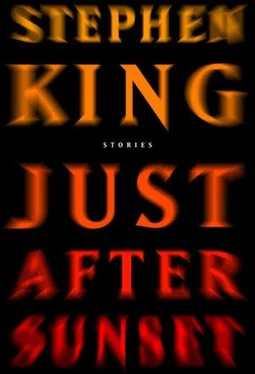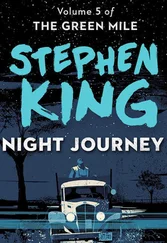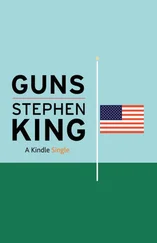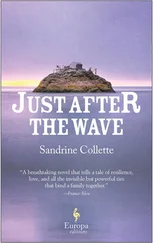Stephen King - Just After Sunset
Здесь есть возможность читать онлайн «Stephen King - Just After Sunset» весь текст электронной книги совершенно бесплатно (целиком полную версию без сокращений). В некоторых случаях можно слушать аудио, скачать через торрент в формате fb2 и присутствует краткое содержание. Город: New York, Год выпуска: 2009, ISBN: 2009, Издательство: SCRIBNER, Жанр: Ужасы и Мистика, на английском языке. Описание произведения, (предисловие) а так же отзывы посетителей доступны на портале библиотеки ЛибКат.
- Название:Just After Sunset
- Автор:
- Издательство:SCRIBNER
- Жанр:
- Год:2009
- Город:New York
- ISBN:978-1-4391-2548-9
- Рейтинг книги:5 / 5. Голосов: 1
-
Избранное:Добавить в избранное
- Отзывы:
-
Ваша оценка:
- 100
- 1
- 2
- 3
- 4
- 5
Just After Sunset: краткое содержание, описание и аннотация
Предлагаем к чтению аннотацию, описание, краткое содержание или предисловие (зависит от того, что написал сам автор книги «Just After Sunset»). Если вы не нашли необходимую информацию о книге — напишите в комментариях, мы постараемся отыскать её.
Just After Sunset — читать онлайн бесплатно полную книгу (весь текст) целиком
Ниже представлен текст книги, разбитый по страницам. Система сохранения места последней прочитанной страницы, позволяет с удобством читать онлайн бесплатно книгу «Just After Sunset», без необходимости каждый раз заново искать на чём Вы остановились. Поставьте закладку, и сможете в любой момент перейти на страницу, на которой закончили чтение.
Интервал:
Закладка:
That was when Sifkitz woke up, sobbing and shaking, legs still in bed, head out and almost touching the floor, hair hanging. He crawled all the way out of the bedroom and started crawling across the main room to the easel under the skylight. Halfway there he found himself able to walk.
The picture of the empty road was still on the easel, the better and more complete version of the one downstairs on the alcove wall. He flung it away without a second look and set up a piece of two-foot-by-two pressboard in its place. He seized the nearest implement which would make a mark (this happened to be a UniBall Vision Elite pen) and began to draw. He drew for hours. At one point (he remembered this only vaguely) he needed to piss and could feel it running hot down his leg. The tears didn’t stop until the picture was finished. Then, thankfully dry-eyed at last, he stood back and looked at what he had done.
It was Carlos’s garage on an October afternoon. The dog, Pepe, stood in front of it with his ears raised. The dog had been drawn by the sound of the gunshot. There was no sign of Carlos in the picture, but Sifkitz knew exactly where the body lay, on the left, beside the work-table with the vise clamped to the edge. If his wife was home, she would have heard the shot. If she was out — perhaps shopping, more likely at work — it might be another hour or two before she came home and found him.
Beneath the image he had scrawled the words MAN WITH SHOTGUN. He couldn’t remember doing this, but it was his printing and the right name for the picture. There was no man visible in it, no shotgun, either, but it was the right title.
Sifkitz went to his couch, sat down on it, and put his head in his hands. His right hand ached fiercely from clutching the unfamiliar, too-small drawing implement. He tried to tell himself he’d just had a bad dream, the picture the result of that dream. That there had never been any Carlos, never any Lipid Company, both of them were figments of his own imagination, drawn from Dr. Brady’s careless metaphor.
But dreams faded, and these images — the phone with the crack in its beige case, the microwave, the bowl of bananas, the dog’s eye — were as clear as ever. Clearer, even.
One thing was sure, he told himself. He was done with the goddam stationary bike. This was just a little too close to lunacy. If he kept on this way, soon he’d be cutting off his ear and mailing it not to his girlfriend (he didn’t have one) but to Dr. Brady, who was surely responsible for this.
“Done with the bike,” he said, with his head still in his hands. “Maybe I’ll get a membership down at Fitness Boys, something like that, but I’m done with that fucking stationary bike.”
Only he didn’t get a membership at The Fitness Boys, and after a week without real exercise (he walked, but it wasn’t the same — there were too many people on the sidewalks and he longed for the peace of the Herkimer Road), he could no longer stand it. He was behind on his latest project, which was an illustration a la Norman Rockwell for Fritos Corn Chips, and he’d had a call from both his agent and the guy in charge of the Fritos account at the ad agency. This had never happened to him before.
Worse, he wasn’t sleeping.
The urgency of the dream had faded a little, and he decided it was only the picture of Carlos’s garage, glaring at him from the corner of the room, that kept bringing it back, refreshing the dream the way a squirt of water from a mister may refresh a thirsty plant. He couldn’t bring himself to destroy the picture (it was too damned good), but he turned it around so that the image faced nothing but the wall.
That afternoon he rode the elevator down to the basement and remounted the stationary bike. It turned into the old three-speed Raleigh almost as soon as he’d fixed his eyes on the wall-projection, and he resumed his ride north. He tried to tell himself that his sense of being followed was bogus, just something left over from his dream and the frenzied hours at the easel afterward. For a little while this actually did the job even though he knew better. He had reasons to make it do the job. The chief ones were that he was sleeping through the night again and had resumed working on his current assignment.
He finished the painting of the boys sharing a bag of Fritos on an idyllic suburban pitcher’s mound, shipped it off by messenger, and the following day a check for ten thousand, two hundred dollars came with a note from Barry Casselman, his agent. You scared me a little, hon, the note said, and Sifkitz thought: You’re not the only one. Hon.
Every now and then during the following week it occurred to him that he should tell someone about his adventures under the red sky, and each time he dismissed the idea. He could have told Trudy, but of course if Trudy had been around, things would never have gotten this far in the first place. The idea of telling Barry was laughable; the idea of telling Dr. Brady actually a little frightening. Dr. Brady would be recommending a good psychiatrist before you could say Minnesota Multiphasic.
The night he got the Fritos check, Sifkitz noticed a change in the basement wall-mural. He paused in the act of setting his alarm and approached the projection (can of Diet Coke in one hand, reliable little Brookstone desk-clock in the other, oatmeal-raisin cookies tucked away safely in the old shirt pocket). Something was up in there, all right, something was different, but at first he was damned if he could tell what it was. He closed his eyes, counted to five (clearing his mind as he did so, an old trick), then sprang them open again, so wide that he looked like a man burlesquing fright. This time he saw the change at once. The bright yellow marquise shape over by the door to the furnace room was as gone as the clutch of beer cans. And the color of the sky above the trees was a deeper, darker red. The sun was either down or almost down. On the road to Herkimer, night was coming.
You have to stop this, Sifkitz thought, and then he thought: Tomorrow. Maybe tomorrow.
With that he mounted up and started riding. In the woods around him, he could hear the sound of birds settling down for the night.
V. The Screwdriver Would Do for a Start
Over the next five or six days, the time Sifkitz spent on the stationary bike (and his childhood three-speed) was both wonderful and terrible. Wonderful because he had never felt better; his body was operating at absolute peak performance levels for a man his age, and he knew it. He supposed that there were pro athletes in better shape than he was, but by thirty-eight they would be approaching the end of their careers, and whatever joy they were able to take in the tuned condition of their bodies would necessarily be tainted by that knowledge. Sifkitz, on the other hand, might go on creating commercial art for another forty years, if he chose to. Hell, another fifty. Five full generations of football players and four of baseball players would come and go while he stood peacefully at his easel, painting book covers, automotive products, and Five New Logos for Pepsi-Cola.
Except…
Except that wasn’t the ending folks familiar with this sort of story would expect, was it? Nor the sort of ending he expected himself.
The sense of being followed grew stronger with every ride, especially after he took down the last of the New York State plat maps and put up the first of the Canadian ones. Using a blue pen (the same one he’d used to create MAN WITH SHOTGUN), he drew an extension of the Herkimer Road on the previously roadless plat, adding lots of squiggles. By now he was pedaling faster, looking over his shoulder often, and finishing his rides covered with sweat, at first too out of breath to dismount the bike and turn off the braying alarm.
Читать дальшеИнтервал:
Закладка:
Похожие книги на «Just After Sunset»
Представляем Вашему вниманию похожие книги на «Just After Sunset» списком для выбора. Мы отобрали схожую по названию и смыслу литературу в надежде предоставить читателям больше вариантов отыскать новые, интересные, ещё непрочитанные произведения.
Обсуждение, отзывы о книге «Just After Sunset» и просто собственные мнения читателей. Оставьте ваши комментарии, напишите, что Вы думаете о произведении, его смысле или главных героях. Укажите что конкретно понравилось, а что нет, и почему Вы так считаете.












